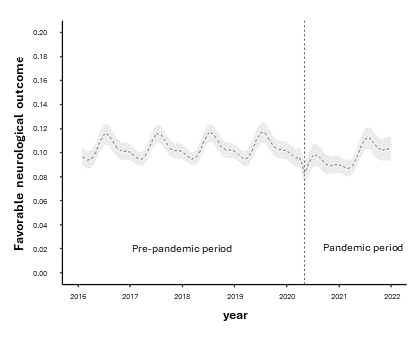Final ID: Sa907
The Impact of the COVID-19 Pandemic on Favorable Neurological Outcome after Out-of-hospital Cardiac Arrest Witnessed by Emergency Medical Service Personnel
Abstract Body: Background: Different from the negative impact of COVID-19 pandemic on outcomes after out-of-hospital cardiac arrest (OHCA) collapsed before emergency medical service (EMS) arrival, there was a report suggested that COVID-19 pandemic did not affect outcomes after OHCA witnessed by EMS personnel. However, no large-scale studies have examined the impact of COVID-19 pandemic after EMS-witnessed OHCA, focusing on favorable neurological outcomes.
Research Questions: Does COVID-19 pandemic affect favorable neurological outcomes after EMS-witnessed OHCA?
Aims: To assess COVID-19's impact on favorable neurological outcomes after EMS-witnessed OHCA.
Methods: We performed an interrupted time series analysis (ITSA) with a prospective, nationwide, population-based registry in Japan to assess trends of incidence and favorable neurological outcome (Cerebral Performance Category 1 or 2) at 30 days with adult EMS-witnessed OHCA between pre-pandemic (January 2016-March 2020) and pandemic (April 2020-December 2021) periods. Subgroup analyses were performed by stratifying regions by infection spread status defined by whether a state of emergency has been declared. To assess whether there are differences in trends between areas with and without COVID-19 spread, we performed a controlled ITSA between the two areas.
Results: We identified 58,315 patients with adult EMS-witnessed OHCA, 41,112 during the pre-pandemic period and 17,203 during the pandemic period. There was no significant increase in the incidence of EMS-witnessed OHCA during the pandemic period (0.03 per 100,000 person-years; 95% confidence interval [CI], –0.02 to 0.08; p = 0.21). Favorable neurological outcome significantly decreased (relative risk [RR], 0.80; 95% CI, 0.71 to 0.91; p < 0.01). In subgroup analysis, favorable neurological outcome significantly decreased in areas with COVID-19 spread (RR, 0.67; 95% CI, 0.56 to 0.81; p < 0.01), while there was no significant difference in areas without COVID-19 spread (RR, 0.91; 95% CI, 0.77 to 1.07; p = 0.24). A controlled ITSA showed that favorable neurological outcome significantly decreased in areas with COVID-19 spread compared to without COVID-19 spread (RR, 0.77; 95% CI, 0.60 to 0.98; p = 0.04).
Conclusion: Unlike previous studies, our research with a nationwide, population-based registry showed that COVID-19 pandemic influenced favorable neurological outcome in EMS-witnessed OHCA. This trend appears to be more pronounced in areas with widespread infection.
Research Questions: Does COVID-19 pandemic affect favorable neurological outcomes after EMS-witnessed OHCA?
Aims: To assess COVID-19's impact on favorable neurological outcomes after EMS-witnessed OHCA.
Methods: We performed an interrupted time series analysis (ITSA) with a prospective, nationwide, population-based registry in Japan to assess trends of incidence and favorable neurological outcome (Cerebral Performance Category 1 or 2) at 30 days with adult EMS-witnessed OHCA between pre-pandemic (January 2016-March 2020) and pandemic (April 2020-December 2021) periods. Subgroup analyses were performed by stratifying regions by infection spread status defined by whether a state of emergency has been declared. To assess whether there are differences in trends between areas with and without COVID-19 spread, we performed a controlled ITSA between the two areas.
Results: We identified 58,315 patients with adult EMS-witnessed OHCA, 41,112 during the pre-pandemic period and 17,203 during the pandemic period. There was no significant increase in the incidence of EMS-witnessed OHCA during the pandemic period (0.03 per 100,000 person-years; 95% confidence interval [CI], –0.02 to 0.08; p = 0.21). Favorable neurological outcome significantly decreased (relative risk [RR], 0.80; 95% CI, 0.71 to 0.91; p < 0.01). In subgroup analysis, favorable neurological outcome significantly decreased in areas with COVID-19 spread (RR, 0.67; 95% CI, 0.56 to 0.81; p < 0.01), while there was no significant difference in areas without COVID-19 spread (RR, 0.91; 95% CI, 0.77 to 1.07; p = 0.24). A controlled ITSA showed that favorable neurological outcome significantly decreased in areas with COVID-19 spread compared to without COVID-19 spread (RR, 0.77; 95% CI, 0.60 to 0.98; p = 0.04).
Conclusion: Unlike previous studies, our research with a nationwide, population-based registry showed that COVID-19 pandemic influenced favorable neurological outcome in EMS-witnessed OHCA. This trend appears to be more pronounced in areas with widespread infection.
More abstracts on this topic:
A Comparison of Synchronized Versus Unsynchronized Mechanical Chest Compressions in a Swine Model
Marill Keith, Menegazzi James, Gumucio Jorge, Salcido David
Post-COVID-19 Patterns of Telehealth Utilization by Cardiovascular Risk Profile in the United StatesJohnson Ericka, Parekh Tarang

